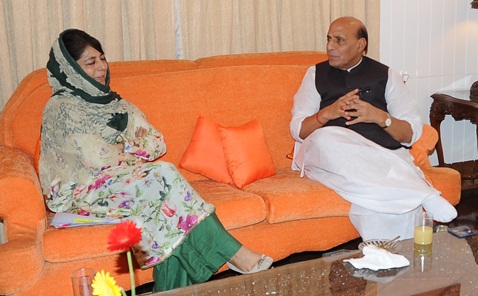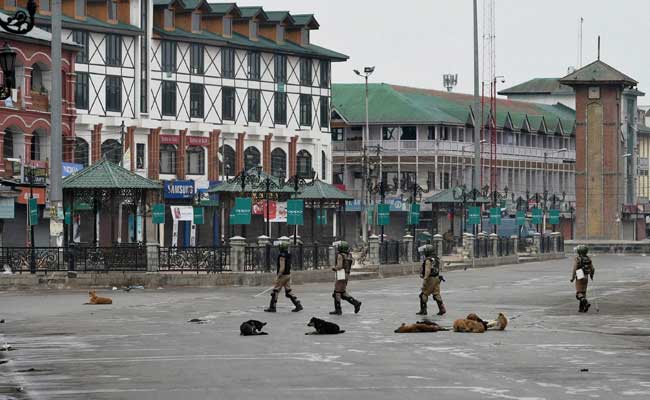Unrest in Kashmir

By Ashok Handoo
New Delhi (Syndicate Features): When the Prime Minister Narendra Modi spoke about Kashmir at a public rally in Madhya Pradesh on 9th of this month there was a great relief for the people who had been, as usual, wondering why he was not speaking on the burning situation in Kashmir. But when he started telling people of Kashmir to grow more apples as the people in rest of India were waiting to taste the sweet fruit from Kashmir it took away the sheen from an otherwise important statement. His assurances to Kashmiris started sounding hollow. It is hard to believe that Modi did not know that the problem in Kashmir today is not lack of development, unemployment or even the economy of the state which has been taking beatings, year after year, due to militancy. It is the political issue that is Kashmir.
So much so, the question: Is Prime Minister Modi’s promise of holding a dialogue with political parties and others to address the real issue sincere or only a crisis management technique?
This concern was reflected in abundant measure in the Rajya Sabha debate on the Kashmir situation. Leader of the opposition, Ghulam Nabi Azad, who is also a former chief minister of J&K, raised doubts about the seriousness of the government in coming to grips with the situation.
While the prime minister has been tweeting on something happening in Africa he has no time to talk about Kashmir, the Congress leader lamented. “He (Modi) spoke on Kashmir that too in Madhya Pradesh a month after trouble erupted in the border state”, he remarked. Azad’s concern therefore was: “Can we expect prime minister’s assurances of initiating a dialogue and standing by the people of the state at all times, to have a major effect in restoring normalcy in the valley?” There is no ready answer.
The Prime Minister has since spoken on Kashmir twice – at the all-party meeting held on Aug 13 and from the ramparts of the Red Fort on the Independence Day. He made it clear that the part of Jammu and Kashmir in Pakistan’s occupation (PoK) very much belongs to India. Placing the blame at Pakistan’s door-step and pointing out that the land of the pure has been exporting to the state, Modi reminded Islamabad of the atrocities it has been committing in occupied Kashmir and Baluchistan. “Time has come to expose Pakistan thoroughly”, he thundered. And directed the External Affairs Ministry to locate people of POK living across the world, talk to them and let the world know what all is happening there.
So far so good. But why the Prime Minister did not invite National Conference, one of the mainstream political parties, which ruled J&K for several decades, to the all party meeting? Doesn’t that raise a doubt, yet again, whether Mr. Modi is putting his best foot forward in dealing with the terribly complex K- issue?
Interestingly, Prime Minister Modi has been telling his domestic audience that both means and ends are important in the fight to root out terrorism in Kashmir. He is repeatedly asserting that the fight is a national responsibility. So does it mean the NDA government would use any method to achieve the end? Opinion is sharply divided given the track record of BJP-led government which has been oscillating between hawkish and mawkish stands.
At the all-party meet, the Prime Minister said that when we talk of Kashmir we cannot forget Jammu, Ladakh and the POK which are part of the state. Quite true, but we would have to do something to resolve the current issue until Pakistan and China vacate the occupied territories. That roadmap is still absent or in any case blurred.
If the Rajya Sabha debate is anything to go by, it only reflected the dismay and anger in equal measure of the members, particularly from the state. Azad described the words Insaniyat, jamhooriyat and Kashmiriyat from Mr, Narendra Modi as sounding weird. “Only the charm of Atal Bihari Vajpayee could win the people of Kashmir with these words because he was sincere in saying so and did follow it up at different levels”.
What was music to the ears of Kashmiris was the observation of Dr. Karan Singh that his father, the last king of the state, Maharaja Hari Singh had acceded to the Indian Union only in three subjects, External Affairs, Defense and Communication. The elder statesman, who was the former Sadre Riyasat (Governor), decried the oft repeated assertion that Kashmir is India’s internal matter. How it can be when half of the area (of Jammu & Kashmir) is with Pakistan and China? So talking to these countries cannot be avoided. Perhaps Sitaram Yechury, the Marxist veteran has hit the nail on its head when he asked the government to find the reasons why the people in Kashmir feel alienated? Unless we address this basic issue, things are not going to improve, he said bluntly.
For the growing sense of disenchantment, there are several reasons. Turning point was undoubtedly the massive rigging of 1987 assembly elections in which Syed Salahuddin, who later became chief of Hizb ul Mujahideen, was a candidate. This sent a wrong signal that while democracy has become deep rooted in rest of India it is not so in Jammu and Kashmir. That unfortunately was the case for a very long time until the Janata government led by Morarji Desai decided to hold free and fair elections in the state.
Another contributing factor for the mess was the inability of the state and the central governments to channelize the energies of the youth and to protect the pro- India forces, of whom there is no dearth.
It is not that things were always as bad.
After all, did not the people of Kashmir come out on the streets with bare hands and sticks to fight back Pakistani raiders in 1947, until the Indian army reached the valley? Who can forget the role of Shaheed Sherwani and Master Abdul Aziz in holding the raiders at bay at a crucial time? Honest introspection alone will help to chart the march ahead.
The mischievous role played by Pakistan from day one has never been in doubt. But can anything different be expected from Islamabad and Rawalpindi combine, who declare that Kashmir is their juggler vein. Certainly not. The ground realities have to be taken into account and the sails adjusted accordingly. That requires wisdom, statesmanship and above all farsightedness. (Syndicate Features)
-
Book Shelf
-
 Book Review
DESTINY OF A DYSFUNCTIONAL NUCLEAR STATE
Book Review
DESTINY OF A DYSFUNCTIONAL NUCLEAR STATE
- Book ReviewChina FO Presser Where is the fountainhead of jihad?
- Book ReviewNews Pak Syndrome bedevils Indo-Bangla ties
- Book Review Understanding Vedic Equality….: Book Review
- Book Review Buddhism Made Easy: Book Review
- Book ReviewNews Elegant Summary Of Krishnamurti’s teachings
- Book Review Review: Perspectives: The Timeless Way of Wisdom
- Book ReviewNews Rituals too a world of Rhythm
- Book Review Marx After Marxism
- Book Review John Updike’s Terrorist – a review
-
-
Recent Top Post
-
 NewsTop Story
What Would “Total Victory” Mean in Gaza?
NewsTop Story
What Would “Total Victory” Mean in Gaza?
-
 CommentariesTop Story
The Occupation of Territory in War
CommentariesTop Story
The Occupation of Territory in War
-
 CommentariesTop Story
Pakistan: Infighting in ruling elite intensifies following shock election result
CommentariesTop Story
Pakistan: Infighting in ruling elite intensifies following shock election result
-
 CommentariesTop Story
Proforma Polls in Pakistan Today
CommentariesTop Story
Proforma Polls in Pakistan Today
-
 CommentariesTop Story
Global South Dithering Away from BRI
CommentariesTop Story
Global South Dithering Away from BRI
-
 News
Meherabad beckons….
News
Meherabad beckons….
-
 CommentariesTop Story
Hong Kong court liquidates failed Chinese property giant
CommentariesTop Story
Hong Kong court liquidates failed Chinese property giant
-
 CommentariesTop Story
China’s stock market fall sounds alarm bells
CommentariesTop Story
China’s stock market fall sounds alarm bells
-
 Commentaries
Middle East: Opportunity for the US
Commentaries
Middle East: Opportunity for the US
-
 Commentaries
India – Maldives Relations Nosedive
Commentaries
India – Maldives Relations Nosedive
-
AdSense code





















